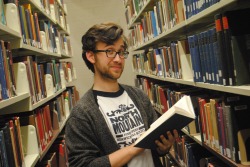A taste of research

By the end of 2020, Memorial aims to be recognized as one of the most student-friendly research universities in Canada. The university hopes to achieve this by engaging not only graduate students, but undergraduate students as well, in research programs where they will gain valuable skills and build meaningful relationships with experienced researchers in their fields.
Since January 2015 more than 70 student-research opportunities enabled undergraduates to get a taste of research through two unique programs: the research-based Memorial Undergraduate Career Experience Program (MUCEP) and the University Student Summer Internship Program (USSIP).
The 2015 winter session offered 56 research positions to undergraduates under the MUCEP program. MUCEP is an on-campus employment program for undergraduate students aimed at providing work experience while allowing students the flexibility to enrol in courses. Students can choose from 40- and 80-hour positions while they pursue their studies.
While MUCEP has been ongoing since 1992, research-based MUCEP positions were launched for the first time in the winter 2015 academic session to encourage undergraduate students to consider research as a viable career option and to provide them with the skills and experience to pursue research in the future. Research MUCEP positions, made available through the Department of Career Development and Experiential Learning (CDEL) and the Office of the Vice-President (Research), spanned many faculties and schools at Memorial, including arts, medicine, science, pharmacy and social work.
In addition to the research MUCEP positions, the Office of the Vice-President (Research) launched USSIP, as well. USSIP provides eligible undergraduate students with the opportunity to carry out a 13- or 16-week research development work term under the supervision of a full-time faculty member. Fourteen students are participating in the 2015 USSIP summer semester.
Seamus Dwyer has been fortunate to participate in both programs. A recently graduated honours student of the Department of English, Faculty of Arts, he spent his research MUCEP position uncovering the origins, tracing the history and mapping descriptions of a unique 18th- and 19th-century book collection at the Mullock Episcopal Library located in the Basilica Museum in St. John’s, the first public library in Newfoundland and Labrador, which dates back to the 1850s.
“A big part of my research is to learn and figure out that this is what I wan
t to do. You never know until you get a taste of research and decide you want to go further with it,” he said.
Mr. Dwyer, who will attend the University of Oxford in the fall to pursue a master’s degree, moved to St. John’s five years ago with his family from New York and New Jersey, U.S. His grandfather is originally from Western Bay, N.L.
“I love being around the books that have been bound and published in the 1800s,” he said. “It’s a very humbling experience to connect with books of a different time period and to piece together the history.”
Dr. Agnes Juhász-Ormsby, associate professor, Department of English, Faculty of Arts, serves as both Mr. Dwyer’s work-term supervisor and honours program supervisor. She emphasizes the program is yet another opportunity for faculty members to advance their research projects and mentor future generations of talented researchers. It’s also a chance to avail of unique skill sets.
“I was very happy with the support I received through the research MUCEP,” said Dr. Juhász-Ormsby. “The support from students, the level of engagement and the different skills they offer provided valuable contribution to my research. It’s wonderful for them but also great for faculty as well.”
As part of his USSIP work term, Mr. Dwyer is working on Dr. Juhász-Ormsby’s Social Sciences and Humanities Research Council-funded project involving 16th-century English school masters, titled The Literary Culture of Early English Schoolmasters: William Lily's Poems. Mr. Dwyer is transcribing, translating and annotating the poetry of William Lily, an English humanist and the first high master ― also known as a headmaster or head teacher ― of St. Paul’s School in London, an independent boys’ school founded in 1509.